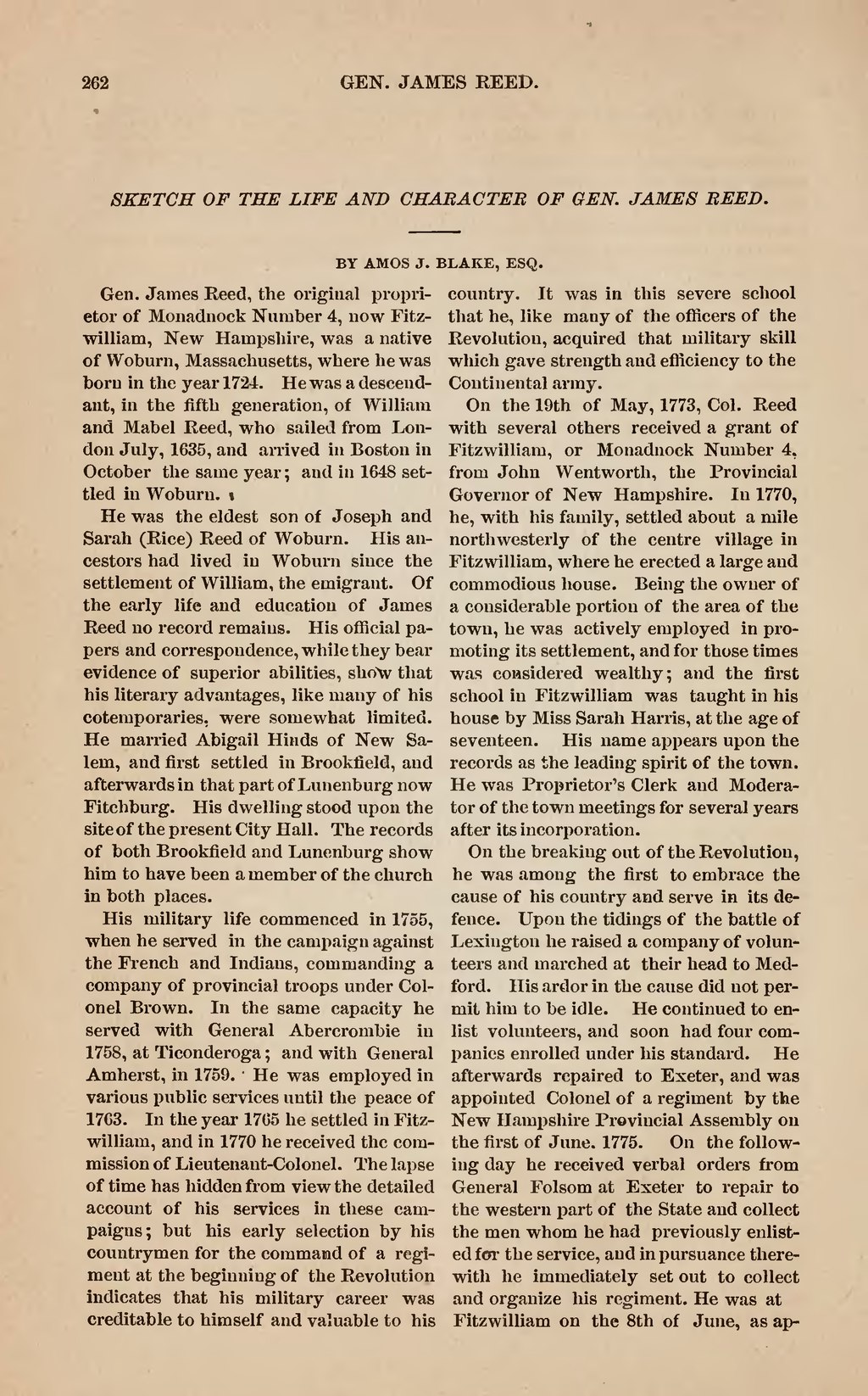262
��GEN. JAMES REED.
��SKETCH OF THE LIFE AND CHABAGTEB OF GEN. JAMES BEED.
��BY AMOS J. BLAKE, ESQ.
��Gen. James Reed, the original propri- etor of Monadnock Number 4, now Fitz- william, New Hampshire, was a native of YVoburn, Massachusetts, where he was born in the year 1724. He was a descend- ant, in the fifth generation, of William and Mabel Reed, who sailed from Lon- don July, 1635, and arrived in Boston in October the same year; and in 1648 set- tled in Woburn. »
He was the eldest son of Joseph and Sarah (Rice) Reed of Woburn. His an- cestors had lived in Woburn since the settlement of William, the emigrant. Of the early life and education of James Reed no record remains. His official pa- pers and correspondence, while they bear evidence of superior abilities, sho\v that his literary advantages, like many of his cotemporaries, were somewhat limited. He married Abigail Hinds of New Sa- lem, and first settled in Brookfield, and afterwards in that part of Lunenburg now Fitchburg. His dwelling stood upon the site of the present City Hall. The records of both Brookfield and Lunenburg show him to have been a member of the church in both places.
His military life commenced in 1755, when he served in the campaign against the French and Indians, commanding a company of provincial troops under Col- onel Brown. In the same capacity he served with General Abercrombie in 1758, at Ticonderoga ; and with General Amherst, in 1759. ■ He was employed in various public services until the peace of 1763. In the year 1765 he settled in Fitz- williaui, and in 1770 he received the com- mission of Lieutenant-Colonel. The lapse of time has hidden from view the detailed account of his services in these cam- paigns; but his early selection by his countrymen for the command of a regi- ment at the beginning of the Revolution indicates that his military career was creditable to himself and valuable to his
��country. It was in this severe school that he, like many of the officers of the Revolution, acquired that military skill which gave strength and efficiency to the Continental army.
On the 19th of May, 1773, Col. Reed with several others received a grant of Fitzwilliam, or Monadnock Number 4, from John Wentworth, the Provincial Governor of New Hampshire. In 1770, he, with his family, settled about a mile northwesterly of the centre village in Fitzwilliam, where he erected a large and commodious house. Being the owner of a considerable portion of the area of the town, he was actively employed in pro- moting its settlement, and for those times was considered wealthy; and the first school in Fitzwilliam was taught in his house by Miss Sarah Harris, at the age of seventeen. His name appears upon the records as the leading spirit of the town. He was Proprietor's Clerk and Modera- tor of the town meetings for several years after its incorporation.
On the breaking out of the Revolution, he was among the first to embrace the cause of his country and serve in its de- fence. Upon the tidings of the battle of Lexington he raised a company of volun- teers and marched at their head to Med- ford. His ardor in the cause did not per- mit him to be idle. He continued to en- list volunteers, and soon had four com- panies enrolled under his standard. He afterwards repaired to Exeter, and was appointed Colonel of a regiment by the New Hampshire Provincial Assembly on the first of June. 1775. On the follow- ing day he received verbal orders from General Folsom at Exeter to repair to the western part of the State and collect the men whom he had previously enlist- ed for the service, and in pursuance there- with he immediately set out to collect and organize his regiment. He was at Fitzwilliam on the 8th of June, as ap-
�� �
